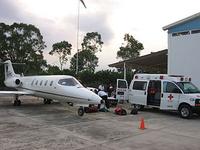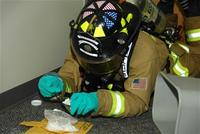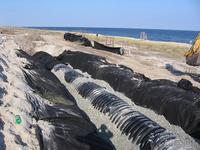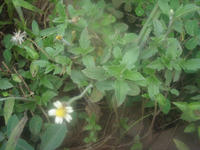-
Office implementing Obamacare avoids furloughs
Gary Cohen, the director of the Center for Consumer Information and Insurance Oversight, said Wednesday that his office will not be furloughing its workers due to the federal budget cuts known as the sequester. His office is in charge of implementing most of President Obama’s healthcare law.
-
-
Preventing bugs from becoming antibiotic-resistant
About 440 000 new cases of drug-resistant tuberculosis emerge annually, causing around 150 000 deaths. New research finds that bacteria can evolve resistance more quickly when stronger antibiotics are used. The rate of evolution of antibiotic resistance speeds up when potent treatments are given because resistant bacterial cells flourish most during the most aggressive therapies.
-
-
Fighting superbugs with a new genre of antibodies
In an advance toward coping with bacteria that shrug off existing antibiotics and sterilization methods, scientists are reporting development of a new family of selective antimicrobial agents that do not rely on traditional antibiotics.
-
-
U.S. hospitals shipping sick immigrants back to their home countries

Hundreds of immigrants who are in the United States illegally end up in the hospital only to find out they will be sent home through a removal system run by hospitals trying to avoid the high cost of treating illegal immigrants.
-
-
Bird flu mutation study offers vaccine clue

Scientists have described small genetic changes that enable the H5N1 bird flu virus to replicate more easily in the noses of mammals. So far there have only been isolated cases of bird flu in humans, and no widespread transmission as the H5N1 virus cannot replicate efficiently in the nose.
-
-
Finding the right tools to respond to suspicious powder incidents

HazMat teams across the United States respond to hundreds of white powder calls each year in large cities where quick decision-making is critical. DHS makes it easier to buy the right technology for bio-threat incidents.
-
-
New device will quickly detect botulinum, ricin, other biothreat agents
Researchers are developing a medical instrument which will be able quickly to detect a suite of biothreat agents, including anthrax, ricin, botulinum, shiga, and SEB toxin. The device, once developed, approved by the Food and Drug Administration (FDA), and commercialized, would most likely be used in emergency rooms in the event of a bioterrorism incident.
-
-
Same-day water test keeps beaches open, swimmers’ health protected

With warm summer days at the beach on the minds of millions of winter-weary people, scientists are reporting that use of a new water quality test this year could prevent unnecessary beach closures, while better protecting the health of swimmers.
-
-
More than 10,000 pesticides approved by EPA without rigorous review
Congress allowed the Environmental Protection Agency (EPA) to use what is called “conditional registration” to approve pesticides deemed especially beneficial for food production – even before all the toxicity tests have been completed. Congress intended conditional registration to be used only sparingly, but the EPS has been using the loophole in a wholesale fashion to approve 65 percent – or more than 10,000 – of the 16,000 pesticides submitted to it for approval. The EPA cannot easily track the history of conditionally approved pesticides to determine whether required toxicity data was submitted, whether that caused a dangerous use of a pesticide to be cancelled, or whether the uses or restrictions should be modified based in such data.
-
-
Predicting disease outbreaks to protect soldiers -- and civilians
Researchers from Johns Hopkins University and the Pentagon develop a new method to predict dengue fever outbreaks several weeks before they occur. The method extracts relationships between clinical, meteorological, climatic, and socio-political data. It can be used in any geographical region and extended to other environmentally influenced infections affecting public health and military forces worldwide. DoD is currently evaluating the method for use in mitigating the effects of infectious disease in various operational settings.
-
-
Hidden dune filters treat coastal stormwater runoff

When it rains, untreated stormwater can sweep pollutants into coastal waters, potentially endangering public health. Now researchers have developed low-cost filtration systems that are concealed beneath sand dunes and filter out most of the bacteria that can lead to beach closures.
-
-
Antimicrobial resistance poses “catastrophic threat” to mankind
The U.K. Department of Health says that global action is needed to tackle the catastrophic threat of antimicrobial resistance, which in twenty years could see any one of us dying following minor surgery. A new report, providing a comprehensive overview of the threat of antimicrobial resistance and infectious diseases, highlights a “discovery void” with few new antibiotics developed in the past two decades. It highlights that, while a new infectious disease has been discovered nearly every year over the past thirty years, there have been very few new antibiotics developed, leaving our armory nearly empty as diseases evolve and become resistant to existing drugs.
-
-
Using plants for herbal defluoridation of drinking water

A filtration system based on a medicinal herb can quickly and easily remove “fluoride” from drinking water, say researchers in India. The technology uses parts of the plant Tridax procumbens as a biocarbon filter for the ion.
-
-
Arsenic in groundwater in Bangladesh naturally occurring
Human activities are not the primary cause of arsenic found in groundwater in Bangladesh. Instead, a team of researchers found that the arsenic in groundwater in the region is part of a natural process that predates any recent human activity, such as intensive pumping.
-
-
Sea surface temperature indicates onset of malaria epidemics
An estimated nine million malaria cases occur in India annually. Researchers find that sea surface temperatures in the tropical South Atlantic Ocean can be used accurately to forecast, by up to four months, malaria epidemics thousands of miles away in northwestern India.
-
More headlines
The long view
We Ran the C.D.C.: Kennedy Is Endangering Every American’s Health
Nine former leaders of the Centers for Disease Control and Prevention (CDC), who served as directors or acting directors under Republican and Democratic administrations, serving under presidents from Jimmy Carter to Donald Trrump, argue that HHS Secretary Roert F. Kennedy Jr. poses a clear and present danger to the health of Americans. He has placed anti-vaxxers and conspiracy theorists at top HHS positions, and he appears to be guided by a hostility to science and a belief in bizarre, unscientific approaches to public health.
